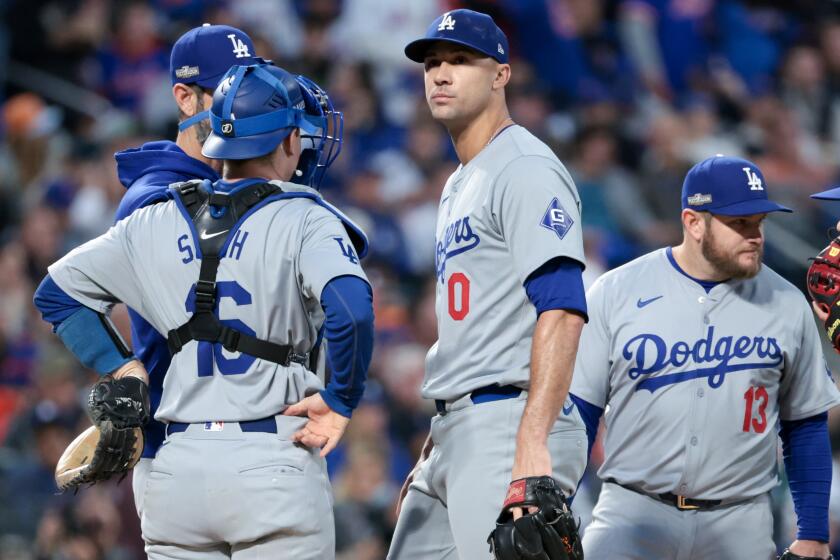Tiger Woods’ return to pro golf; homeowners who invite foreclosure; treating the mentally ill
What Tiger could do
Re “At Masters, Woods seeks a quiet return,” March 17
Personally, I’m not ready to see Tiger Woods on television just yet.
What may have redeemed him in my eyes would have been for him to fill up one of his private planes with food and supplies and flown it to Port-au-Prince, Haiti -- and then get his hands dirty by picking up a shovel, helping to find the living or helping to bury the dead.
But not seeing him on the golf course at Augusta National Golf Club, making more money to give to whom -- his next round of mistresses?
Tracy Nadeau
Los Angeles
When borrowers choose to default
Re “Why they walk away,” March 17
It is troubling to witness the moral decay in this country. People refinance their houses, invest or spend the new cash generated, then walk away from their obligation because it is inconvenient.
People who have the capacity to pay their debts but dredge up excuses not to honor them are not financially bankrupt, but they may be morally bankrupt. It’s never their fault. It was the greedy banks or the faulty regulatory system -- or maybe their neighbor did it, so it must be OK.
I sure miss the world of personal responsibility. This is not the America I once knew, and it makes me sad.
Michael Card
Dana Point
It’s always grimly amusing to watch someone who has done something wrong contort logic to absolve herself of blame -- especially when that person is a psychologist.
Wynn Bloch, and others like her who walk away from their debts just because they can, have indeed “cheated and stolen” something: They’ve cheated the system and stolen a little bit of the integrity on which the world depends.
One wishes Bloch’s former patients had been as cavalier with their debts to her, starving her of the capital she needed to enter the housing market and stick others with the bill.
Kevin McCarthy
Los Angeles
The greatest freedom we have in the U.S. is to say no. We citizens try to get our voices heard. We play by the rules, pay our bills and taxes, and vote -- and we are ignored by our representatives and big business.
Some are justifiably angry but are vilified when they gather to protest. The better way to get the attention of Washington and Wall Street? Stop paying our bills, stop paying our taxes, walk away from mortgages and opt out of funding institutions that have no interest in the well-being of those who support them. We’ll see how quickly we get financial reform in this nation.
We feed the beast every single day. I say starve it.
Stephanie Georgieff
Santa Ana
Though The Times accurately noted that more homeowners are choosing to surrender their home and let the lender foreclose, it left the impression that most borrowers are able to simply walk away from all their mortgage loans.
In my experience, the majority of homeowners with problems paying their home loans have both a first and second mortgage on their home. Unless the second mortgage was used to purchase the property in which the borrower resided, the lender holding the second (and third) mortgage will be able to sue the borrower on the underlying note as a “sold-out junior lien holder” after the first mortgage lender completes its foreclosure sale. This will be the case if the borrower obtained the second mortgage as part of a refinance loan or as a home-equity line of credit after the property was purchased.
Many do not realize that this liability to the junior lender remains after the senior lender forecloses, and a lot of borrowers end up seeing an attorney to file bankruptcy when they receive a letter from a collection agency or are served with a lawsuit by the junior lender.
James Selth
Redondo Beach
The writer is a bankruptcy attorney.
No competition among oil firms
Re “Blaming Big Oil,” Editorial, March 15
No manipulation of oil markets? Hah! While the antitrust agencies were asleep or politically emasculated, Exxon and Mobil merged, Chevron took over Texaco, BP swallowed Arco and Conoco and Phillips got together.
The result is a petroleum oligarchy in which overt collusion isn’t necessary. They all think alike, and they all have reached the conclusion that artificial shortages are more profitable than competition.
The evidence of collusion isn’t in anything they’ve done. It’s in what they haven’t done. Not one of these behemoths has done anything to challenge its rivals for market share. There’s no one left who feels any need to grow.
In each case, the argument for consolidation was increased efficiency. Taken to its logical conclusion, this would be an argument for nationalization. Hmmm.
David Mathews
Downey
Treating the mentally ill
Re “Law and disorders,” Opinion, March 14
Each wave of deinstitutionalization in California has been carried out with the promise that treatment would follow to help ex-patients.
Proven, evidence-based projects, such as the MHA Village in Long Beach, have shown that most ex-patients can be integrated into the community for far less than it costs to institutionalize them. Unfortunately for us all, services for the most vulnerable are the services most often cut.
Legislation exists to treat people who refuse it if they are a danger to themselves or others or are gravely disabled. Laura’s Law may reinforce the powers of the state in select cases. But it is not the answer for most with severe mental illness who go untreated. All they require are adequately funded, well-designed community treatment programs.
Joyce Thompson
Los Angeles
Thank you for bringing attention to this serious issue. I strongly support Laura’s Law. I live in Orange County, which hasn’t yet passed the resolution. This alarms me. I know firsthand the effects an untreated mental illness has on loved ones.
My dad developed a severe mental illness in his 50s that caused him to attempt suicide three times, abandon his wife, spend his life savings and end up homeless on the streets.
We did everything in our power to get Dad help, but he refused treatment. Laura’s Law will save other families from the suffering inflicted on ours. I shudder at the thought of becoming mentally ill, not being treated and ending up like my father.
Amanda LaPera
Laguna Hills
Interpretations of history
Re “History, by the book,” Opinion, March 17
Jonathan Zimmerman notes the reaction of the Texas Board of Education to the negative liberal interpretation of America’s past. Is American history in general a tale of accomplishments and virtue, or is it one of unspeakable crimes against man and nature?
As I tell my students, the past -- as past -- is indeed dead. History is something that is happening now. There are numerous historical facts that, contrary to the popular notion, do not “speak for themselves.”
Were we great pioneers shaping a glorious future, or Indian killers and violators of natural resources? This depends on the historian, which facts he chooses to engage and what interpretation he gives them. His conclusion is contingent on his personality and view of life.
Because the historian does not live in isolation but in society at large, the picture he draws of our past is also very instructive concerning our societal view of ourselves.
Jack Kaczorowski
Los Angeles
More to Read
Go beyond the scoreboard
Get the latest on L.A.'s teams in the daily Sports Report newsletter.
You may occasionally receive promotional content from the Los Angeles Times.










